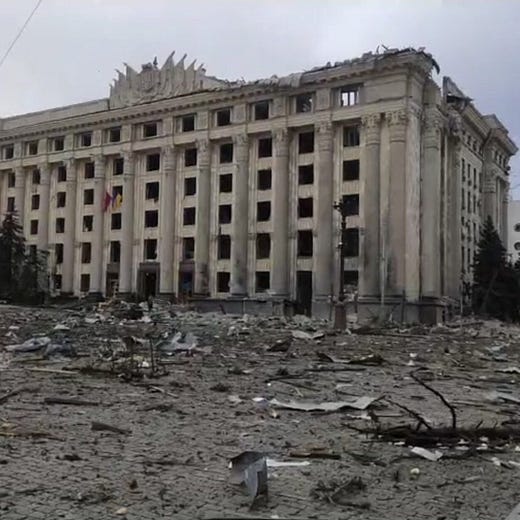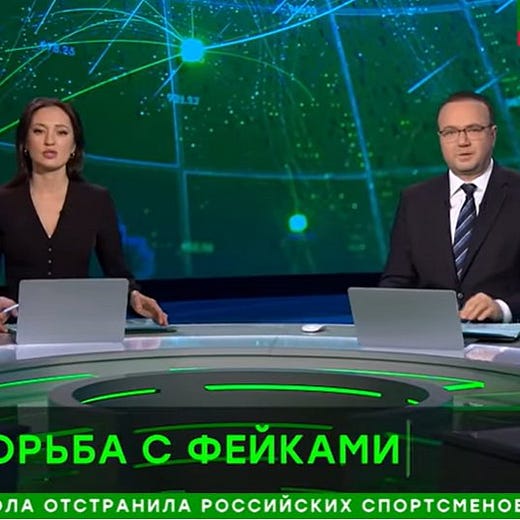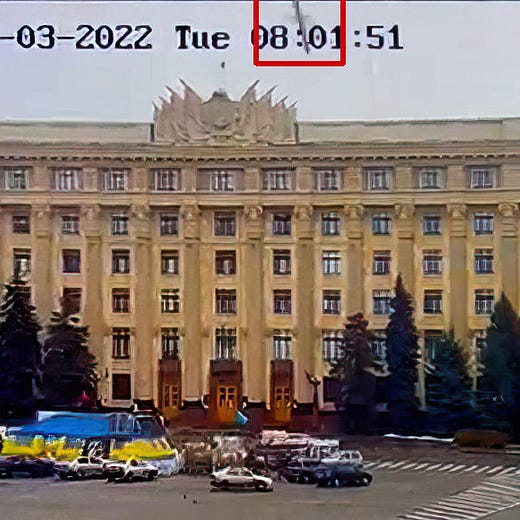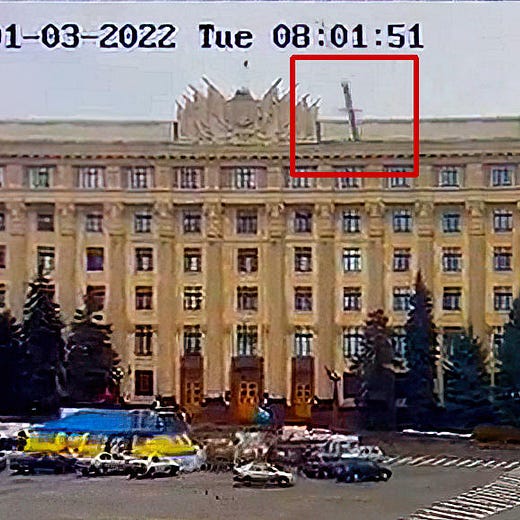Putin fights the propaganda war at home
Think Fox News is bad? Try Russian state TV.

I devote a lot of time and energy in this newsletter to exposing the right-wing spin and misinformation pushed by America’s top-rated TV “news” network. Russian state TV makes Fox News look like 60 Minutes.
Americans obviously learned a lot about Russian information warfare during and after the 2016 presidential campaign, when the Kremlin was involved in hacking Democrats and waging propaganda campaigns to sow division and help Trump. Russian state TV’s coverage of the war on Ukraine shows how those same disinformation tools are used to manipulate public opinion in Russia.
News broke early on Tuesday of terrible rocket strikes in central Kharkiv that killed at least 10 people and wounded 35 more. Footage quickly emerged of a prominent government building being demolished in a flash.
It seemed like a pretty clearcut case of Russia trying to demoralize the Ukrainian population by attacking civilian targets. But Russian TV got busy turning reality upside down.
Francis Scarr monitors Russian state TV for the BBC. On Wednesday, he detailed how the Gazprom-owned NTV channel told viewers that the government building in Kharkiv was actually blown up by the Ukrainian military. (State TV in Belarus ran with a similar story.)
That version of events, beyond simply not passing the laugh test, is easily and quickly debunked. Christo Grozev, executive director of Bellingcat, used a frame-by-frame video analysis to conclude that the Ukrainian military doesn’t even have the type of missile that struck the building.
In a direct message exchange, Julia Davis, Russian media analyst for the Daily Beast, told me that this type of coverage is the norm on Russian state TV.
“They're basically blaming everything like this on the Ukrainian military,” she said.
Russia isn’t China when it comes to media censorship, but it’s getting worse
Russian media is pumping out misinformation at a time when actual information is becoming harder to access there. While Twitter, Facebook, and foreign news sites remain available, Russian lawmakers are drafting legislation to criminalize the posting of “fake” information on Facebook, and state media is talking about the possibility Facebook will be blocked altogether.
Meanwhile, independent outlets such as the 30-year-old Echo of Moscow radio station are being taken off the air.
In a direct message exchange, Sarah Hurst, a UK-based journalist and Russia expert perhaps best known as “X Soviet” on Twitter, told me that while foreign social platforms and sites remain available in Russia, “most Russians won't look for news in English or other languages, or even look past official news.”
“I didn't know how bad things were getting when I last went to Russia in 2013 to visit friends,” added Hurst. “They were in their 50s. The husband listened to Echo of Moscow and tried to tell the wife that NGOs were being deemed foreign agents. She shouted at him not to disrespect the president. She is an interpreter, fluent in English, very smart and well travelled, who helped scientists organize polar expeditions.”
Along similar lines, on Tuesday BBC Moscow correspondent Steve Rosenberg posted a mini-documentary about the hold that Russian state TV has on some Russians.
“A lot of what they say on TV, it’s truth. It’s true,” one Russian woman who gets all her news from state TV told Rosenberg. “When I read in a foreign newspaper that Russians bomb Kharkiv and so on, I know that it’s not true, because they promised not to do this and they would never do this.”
While Russian authorities crack down the misinformation at home, Kremlin-funded outlets aimed at foreign audiences like RT and Sputnik have been characterizing the invasion of Ukraine as “liberation” and echoing Putin’s remarks about how the goal is to denazify the country (never mind that President Zelensky is Jewish). But it’s becoming harder for the Kremlin to use these outlets to spread propaganda abroad.
RT and Sputnik are becoming global pariahs as well
That’s because, as the Wall Street Journal reported Tuesday, “RT and other Russia-backed media outlets are facing an unprecedented squeeze in response to Russia’s invasion of Ukraine, as pay TV operators and tech platforms across the globe take steps to curtail their reach.” DirecTV and major Canadian telecom operators have vowed to drop RT, Google dropped RT and Sputnik from its Play Store, and the EU banned RT and Sputnik over Ukraine disinformation.
Those developments aren’t great news for Putin. But with the NATO countries already solidly united against his regime, the most important thing for him right now is to make sure Russians at home don’t revolt. More than 6,500 have been arrested in anti-war demonstrations across the country in recent days.
Hurst told me that discontent within Russia has increased since Putin first invaded Ukraine eight years ago.
“Far more people are protesting than in 2014, when it was just a few solo picketers supporting Ukraine,” she said.
With any hopes Putin had for a lightning victory in Ukraine now dashed and Russia’s economy reeling from unprecedented sanctions, misinformation likely won’t be enough to quell domestic discontent.









